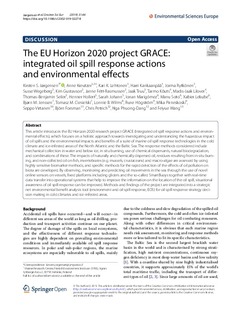| dc.contributor.author | Jørgensen, Kirsten S. | |
| dc.contributor.author | Kreutzer, Anne | |
| dc.contributor.author | Lehtonen, Kari | |
| dc.contributor.author | Kankaanpää, Harri | |
| dc.contributor.author | Rytkönen, Jorma | |
| dc.contributor.author | Wegeberg, Susse | |
| dc.contributor.author | Gustavson, Kim | |
| dc.contributor.author | Fritt-Rasmussen, Janne | |
| dc.contributor.author | Truu, Jaak | |
| dc.contributor.author | Kouts, Tarmo | |
| dc.contributor.author | Lilover, Madis-Jaak | |
| dc.contributor.author | Seiler, Thomas-Benjamin | |
| dc.contributor.author | Hollert, Henner | |
| dc.contributor.author | Johann, Sarah | |
| dc.contributor.author | Marigómez, Ionan | |
| dc.contributor.author | Soto, Manu | |
| dc.contributor.author | Lekube, Xabier | |
| dc.contributor.author | Jenssen, Bjørn Munro | |
| dc.contributor.author | Ciesielski, Tomasz Maciej | |
| dc.contributor.author | Wilms, Lonnie B. | |
| dc.contributor.author | Högström, Rune | |
| dc.contributor.author | Pirneskoski, Mika | |
| dc.contributor.author | Virtanen, Seppo | |
| dc.contributor.author | Forsman, Björn | |
| dc.contributor.author | Petrich, Christian | |
| dc.contributor.author | Dang, Nga Phuong | |
| dc.contributor.author | Wang, Feiyue | |
| dc.date.accessioned | 2020-02-07T10:08:00Z | |
| dc.date.available | 2020-02-07T10:08:00Z | |
| dc.date.created | 2019-09-11T13:59:40Z | |
| dc.date.issued | 2019 | |
| dc.identifier.citation | Environmental Sciences Europe. 2019, . | |
| dc.identifier.issn | 2190-4715 | |
| dc.identifier.uri | http://hdl.handle.net/11250/2640280 | |
| dc.description.abstract | This article introduces the EU Horizon 2020 research project GRACE (Integrated oil spill response actions and environmental effects), which focuses on a holistic approach towards investigating and understanding the hazardous impact of oil spills and the environmental impacts and benefits of a suite of marine oil spill response technologies in the cold climate and ice-infested areas of the North Atlantic and the Baltic Sea. The response methods considered include mechanical collection in water and below ice, in situ burning, use of chemical dispersants, natural biodegradation, and combinations of these. The impacts of naturally and chemically dispersed oil, residues resulting from in situ burning,and non-collected oil on fish, invertebrates (e.g. mussels, crustaceans) and macro-algae are assessed by using highly sensitive biomarker methods, and specific methods for the rapid detection of the effects of oil pollution on biota are developed. By observing, monitoring and predicting oil movements in the sea through the use of novel online sensors on vessels, fixed platforms including gliders and the so-called SmartBuoys together with real-time data transfer into operational systems that help to improve the information on the location of the oil spill, situational awareness of oil spill response can be improved. Methods and findings of the project are integrated into a strategic net environmental benefit analysis tool (environment and oil spill response, EOS) for oil spill response strategy decision making in cold climates and ice-infested areas. | |
| dc.description.abstract | The EU Horizon 2020 project GRACE: integrated oil spill response actions and environmental effects | |
| dc.language.iso | eng | |
| dc.subject | Oil spill response | |
| dc.title | The EU Horizon 2020 project GRACE: integrated oil spill response actions and environmental effects | |
| dc.type | Peer reviewed | |
| dc.type | Journal article | |
| dc.description.version | publishedVersion | |
| dc.subject.nsi | VDP::Miljøteknologi: 610 | |
| dc.subject.nsi | VDP::Environmental engineering: 610 | |
| dc.source.pagenumber | 10 | |
| dc.source.journal | Environmental Sciences Europe | |
| dc.identifier.doi | 10.1186/s12302-019-0227-8 | |
| dc.identifier.cristin | 1723665 | |
| dc.relation.project | EU/EU Horizon 2020, Agreement No. 679266 | |
| cristin.unitcode | 6228,0,0,0 | |
| cristin.unitname | Norut Northern Research Institute Narvik AS | |
| cristin.ispublished | true | |
| cristin.fulltext | original | |
| cristin.qualitycode | 1 | |
